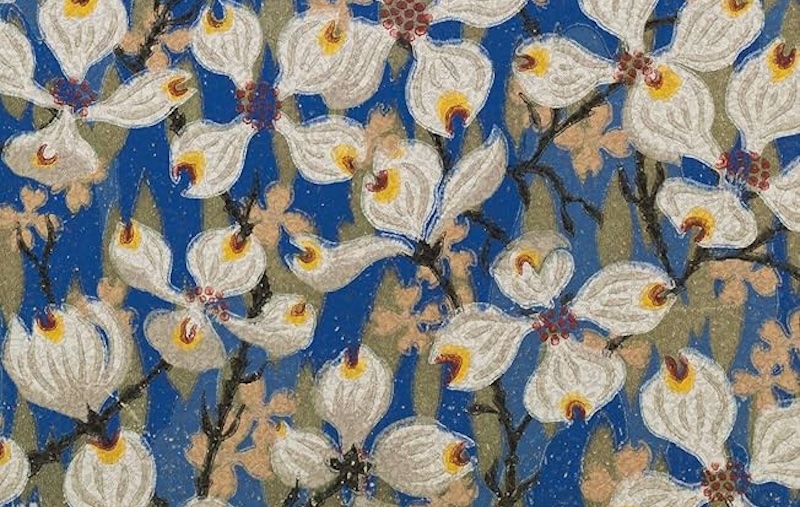
Glass Houses, Hells, and Phantom Limbs: Seven New Poetry Collections to Read in May
Rebecca Morgan Frank Highlights What Books to Check Out This Month
“To what purpose, April, do you return again?” Edna St. Vincent Millay asks in “Spring.” “Not only under ground are the brains of men / Eaten by maggots. / Life in itself / Is nothing.” But don’t despair, fellow readers, it is May now, when, for some of us, the trees are finally (finally!) coming into bloom. While Millay doesn’t fit the time period for this month’s Super Gay Poems from Stephanie Burt, Angie Estes, whose Last Day on Earth in the Eternal City drops this month, makes the cut.
This stack of May books offers the unsettling balm you may need right now, from the imaginative mythologies of Lee Min-ha and Yuki Tanaka to Shane McCrae’s consolidated epic Hell, to a new collection from Henri Cole and a debut from Jess Smith from University of Akron Press. This month also delivers Mia Ayumi Malhotra’s Mothersalt (Alice James Books) and a few titles I covered earlier this year, Rob Macaisa Colgate’s Hardly Creatures and Jim Moore’s Enter. Happy Spring, fellow poetry readers!
*
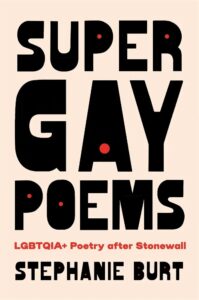
Stephanie Burt, Super Gay Poems
(Harvard University Press)
Welcome to 2025’s Super Gay poetry party, hosted by critic and poet Stephanie Burt. Frank O’Hara’s “Homosexuality,” kicks off her fifty-one choices for this anthology of “Super Gay” post-1969 poems, each followed by her commentaries, while The Cyborg Jillian Weise closes the book out with the final line of “So Your GF Wants to Come Out as Bi and Polyamorous to Her Very Conservative Family”: “Come out alive.” Amidst the generational spread of expected figures in American poetry—from Adrienne Rich, John Ashbery, and Audre Lorde to Carl Phillips and D.A. Powell, and from Jericho Brown to Danez Smith and Chen Chen—readers will find plenty to discover, such as Aotearoa New Zealand trans poet essa may ranapiri and, through a lively ode to the glass dildo in “Glass Orgasm,” Jee Leong Koh, founder of Singapore Unbound. “Super Gay” stands as the catchy umbrella for the range of sexual and gender identities reflected, and Burt conscientiously embraces “how the words in poems can reflect our inner, not only our outwardly visible, lives.”
Why these poets and these poems? Burt notes, “All the poets in this book do something memorable and moving and acoustically interesting with the shapes of queer lives.” Part of the fun of reading this is considering the poets and poems you might have let in, or left out, while also enjoying Burt’s astute and personable criticisms that confirm her choices. Pick this up in time for summer; as O’Hara concludes, “It’s a summer day, / and I want to be wanted more than anything else in the world.”
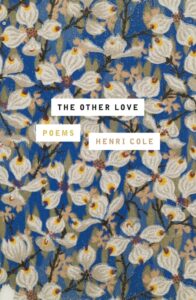
Henri Cole, The Other Love: Poems
(Farrar, Straus and Giroux)
Henri Cole’s eleventh collection follows Gravity and Center: Selected Sonnets, 1994-2022; not everything in this new collection is a Cole sonnet, but enough are to carry the tune. These are also American odes—conversational, erudite, and a little earthy—with titles ranging from “Guns,” “Mouse in the Grocery,” and “Daffodils” to “Figs”: “Overnight the figs got moldy and look like little brains—/ or ids without structure—that say something dark/ about our species not really laying down a garden / but living out the violent myths.” This speaker observes as he talks back to T.S. Eliot from his Gloucester summer home in “Young Tom’s Room,” and to James Merrill from Merrill’s window in “107 Water Street.” In “Sow with Piglets,” he muses, “But here, under a dispassionate night sky, / in pig time, with blue moonlight filtering / through the cedars, I ask, Why do you leave /for happiness? Why not stay around awhile?”
The vantage is clear—this is a speaker moving into later chapters of life—while the gracious questioning lyricism is a continuance for Cole. In “No One Over Fifty, Please,” the speaker turns, “Since we don’t know if we live beyond this life, / let’s give ourselves to loving—/to eyes, hands, lips, and ears. / Do you hear those birds talking—/ is there anything more ravishing?”
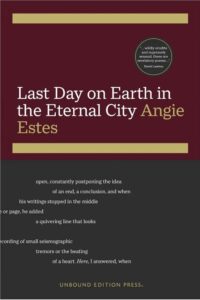
Angie Estes, Last Day on Earth in the Eternal City
(Unbound Edition Press)
“Mother may I / moon glow, Mother may / I know who bruised the moon, left / its scar on the back of my arm like some /celestial heirloom.” This is a book of air—birds, the space within the poems, unexpected kinds of flight: “If only/ memory would descend like snow / coming down on every side of Philip Johnson’s/ Glass House: he said that lying inside with / snow falling all around made it seem as if you were / rising on a “celestial elevator.” The capacious mind and memory of these poems moves between Tintoretto, Cole Porter, Huck Finn, Dali, Faulkner, Michelangelo, and “In the Lover the Leaves You,” “her design / for Lady Macbeth’s dress: one thick red drip of blood sewn in from waist to floor.”
But there’s also room for fungi and bees. Throughout, the echo of a loss of a mother: the one-sentence “Solstice,” unravels over two pages of memory, of the speaker’s mother’s words, of honeysuckle behind the church where the ten-year-old self is “pulling each flower’s pistil back through / its throat to drip one sweet bead / onto my tongue,” of Proust, “as if the shorter / the days become, the longer the sentence / needs to be.”
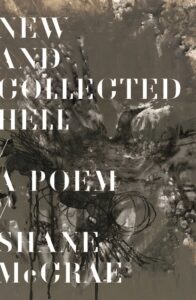
Shane McCrae, New and Collected Hell: A Poem
(Farrar, Straus and Giroux)
What better move for these times than to collect all your Hell poems and make them new, and one? Fusing and revisiting new poems and poems from The Gilded Auction Block and Cain Named the Animal, as well as a chapbook, McCrae reimagines what a New and Collected can be for him. It’s hard not to admire the boldness of this concept and execution of this now-epic, with its robot bird named Law at the center.
The truth is: it works, this allusive compelling descent, its joints made fluid through echoes of images and actions, from splattering to climbing to laughing, all marked by the weight of foundational lines such as “My body I had been was shaped / by chaos hidden in the bone.” McCrae’s tenth book stands out amongst its own, even as it comes out of them, and raises interesting questions about how more selected/collected reinventions might give general readers the vantage and pleasures that poets and critics experience when piecing together threads across collections.
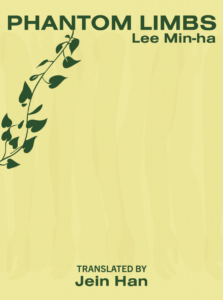
Lee Min-ha, Phantom Limbs, translated by Jein Han
(Ugly Duckling Presse)
“The tree’s flabby torso is covered with human fingerprints / and like bits of bark fallen from trees, human palms are scattered on /the bare road.” The opening poem of Lee Min-ha’s 2005 debut, Phantom Limbs, newly translated from the Korean by Jein Han, catapults the reader into the grotesque interventions and intersections of humanity: the poem ends, “a man is shoving the rest of his hips into the tree’s torso.” With dizzying acts of transformation—bodies breaking, morphing, bending, bleeding, Lee Min-ha blows up and estranges in something that explodes beyond the play of the most popular American prose poems past.
She offers a visual kind of listening, even in translation: think Frost’s “sentence sounds” but the people are “inside a door” while “Trapped outside the door/ I hoist my ears, large as houses, until the day breaks // The birds that woke before me are like fists / that clench their beaks and knock on eardrums.” Imaginative, quick in wit and pace: these are poems that will slow you down. This left me looking forward to more Lee Min-ha collections in translation and more Jein Han translations.
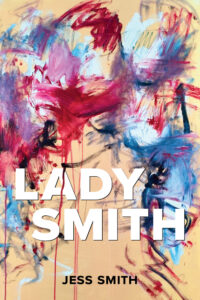
Jess Smith, Lady Smith
(University of Akron Press)
Prepare for riffs and slippage, for romp and list in the formal leanings of Jess Smith’s debut, Lady Smith, winner of the 2023 Akron Poetry Prize; these are sharpened tools for dismantlings of patriarchal violences and inheritances amidst the collection’s move towards reclamations of sexual and intellectual power. Smith’s poems toggle from the violating questions of “Mandatory Reporter” to the tensions of “Training”: “For miles, my eyes / are horse not human, turning side/ and more side to catch first what is trying// to catch me,” to “Lady Smith,” in which the speaker holds ‘[h]is first gift. My West Texas/ protection. My pink handle with grooves // designed for smaller hands.” An underlying narrative unfolds in this collection, culminating, unexpectedly in life—a meditation for the speaker’s “child / who is full morning, aubade, child whose / response is most often song . . . .” Aubade. Smith locks us in in the swerves of this final poem: neither love nor gun protects us.
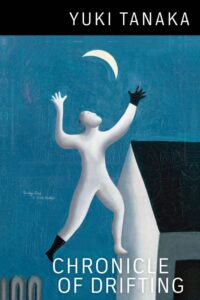
Yuki Tanaka, Chronicle of Drifting
(Copper Canyon Press)
“I listen to the moon but it doesn’t say much about my life,” begins Yuki Tanaka’s imaginative debut collection. These poems offer a mesmerizing triangulation of imagery, intellect, and invention, the sensibilities of a poet born and raised on a small island in Yamaguchi, Japan and whose notes reveal that one poem, “Discourse on Vanishing” is an erasure of his doctoral thesis. Brief excerpts don’t allow for the slippery and imaginative modes in which some of his narratives morph from the straightforward to the strange, often leaping through sentence fragments.
The title poem offers a series of prose poems that move from the speaker eating hotpot, reading, getting a haircut, or even attending “A long faculty meeting about punctuation, the aesthetics of powerpoint,” and then swerve and tumble toward such final figures as “I want to be a stagnant pool of water reflecting a face.” “The Body in Fragments” begins with a woman drinking peppermint tea and transforms: “A spider eats clouds to make a web / in which she is caught with her parents and her lover,” and “When she looks out the window for a new landscape, she thinks, If I carry that meadow, folded in my pocket, and spread it back home, / our cows will go mad.” If I’ve made this sound formulaic, forgive me, as it is anything but: read it.
Rebecca Morgan Frank
Rebecca Morgan Frank's fourth collection of poems is Oh You Robot Saints! (Carnegie Mellon UP). Her poetry and prose have appeared in such places as The New Yorker, Ploughshares, American Poetry Review, and the Los Angeles Review of Books. She is an assistant professor at Lewis University and serves on the Board of Directors of the National Book Critics Circle. She lives in Chicago.



















